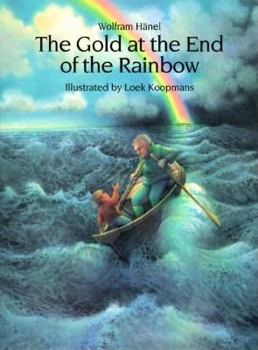Gold at the End of the Rainbow
Select Format
Select Condition 
Book Overview
Daniel's grandfather insists that the story about treasure at the end of a rainbow is only a fairy tale, but when he and Daniel encounter a leprechaun after spending a day looking for the gold, he is... This description may be from another edition of this product.
Format:Hardcover
Language:English
ISBN:155858692X
ISBN13:9781558586925
Release Date:March 1997
Publisher:NorthSouth (NY)
Length:32 Pages
Weight:0.75 lbs.
Dimensions:0.4" x 8.8" x 11.6"
Age Range:5 to 8 years
Grade Range:Preschool to Grade 3
Customer Reviews
1 rating
Gold isn't everything
Published by Thriftbooks.com User , 20 years ago
John Peters (NYTBR) completely misses the point of the book, in my opinion. While Brendan and Grandpa live a meager existence, they still love each other. Grandpa provides as well as he can, and Brendan is content and uncomplaining. When they miss out on the opportunity to have wealth beyond imagination, they don't plot and scheme to recapture the leprechaun. Instead, they realize they have at least enough to get by (they are both dressed well, and neither is starving). To quote Muddy Waters, "You can't lose what you ain't never had." And so they return home to find that the leprechaun has unexpectedly repaid their kindness. The gold was never theirs to begin with, and the story shows that their integrity matters. And they got to see a leprechaun. How many manage that feat? I think this is an important lesson for children to learn. Whether we find something belonging to someone else, or fool them into giving it over to us, it isn't really ours--except by rationalization. I suspect that if Brendan or Grandpa found someone else's sack of gold, he would return it sadly, but willingly. And would be just as surprised by any reward for honesty. Character is more important than material gain. While I agree with some of his points about the art, I like the leprechaun. Never having seen one, I have no idea of what they look like. A being who lives at the end of a rainbow might well be as colorful. Who knows for sure? Imagination trumps literalism, IMHO.





